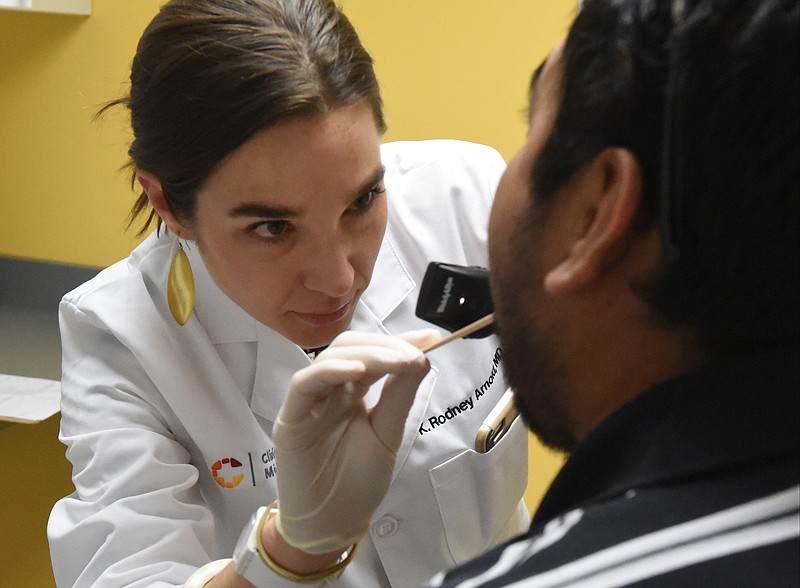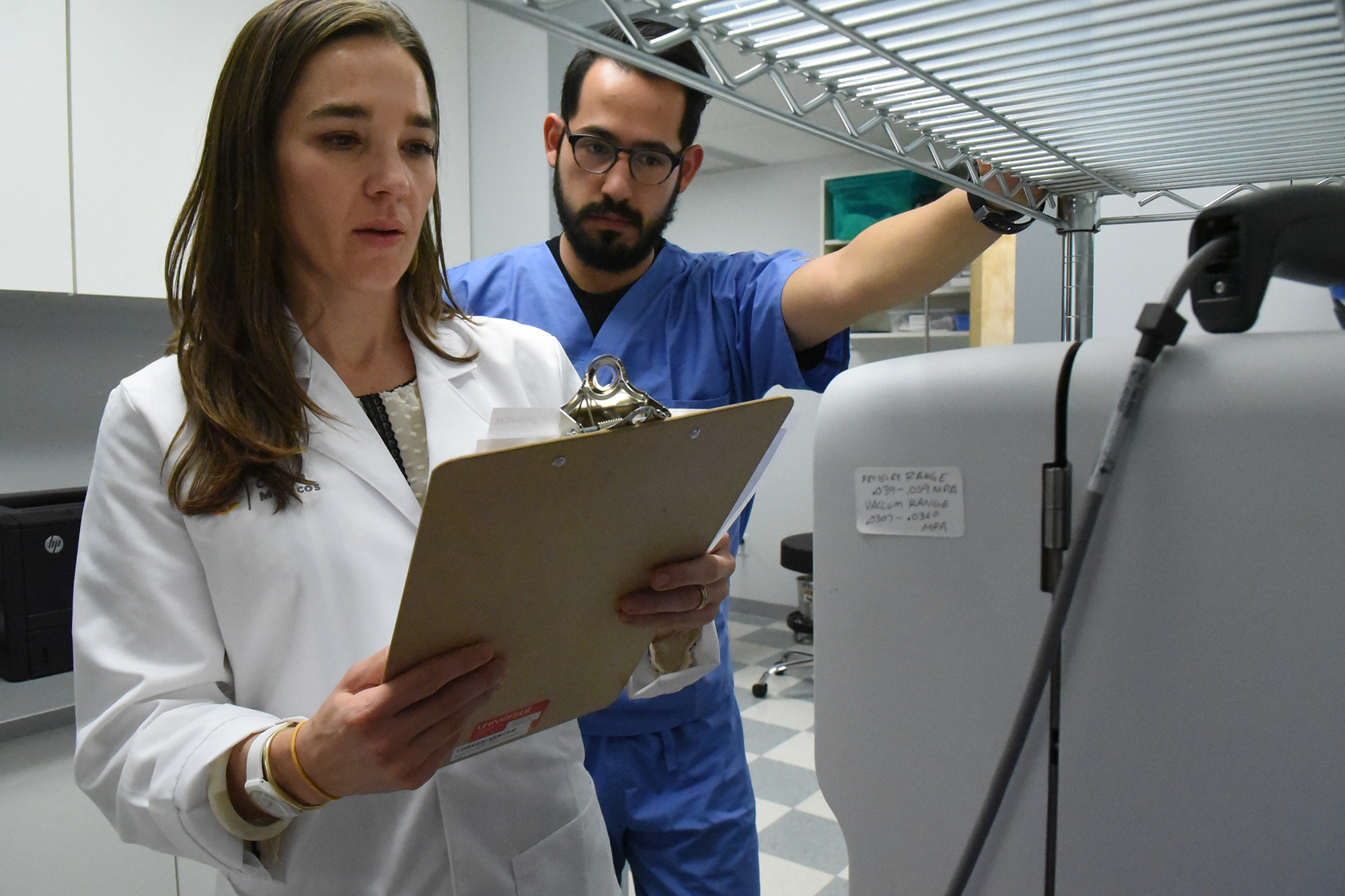Enrique Gomez can't remember going to the doctor once over the last 10 years. He's been blessed with good health, he says. When he catches a bug, he soldiers through it, working 70 hours a week at a mechanic shop and a restaurant.
He has a wife and four kids to provide for. He doesn't have time for illness.
But when the pain on the left side of Gomez's face and throat grew so excruciating that he could not open his mouth or swallow, he knew he needed help. His wife suggested he try a new clinic she had heard about over on the corner of Holtzclaw and 23rd Street in Chattanooga, where the physicians speak Spanish. Gomez, who speaks little English, showed up feverish in the waiting room of Clinica Medicos last Sunday.
Three days later, sitting in an examination room back in the clinic, Gomez told his physician, Dr. Kelly Arnold, that he felt much better. She had treated the infection with antibiotic injections, and the swelling had receded. His white blood cell count was back to normal. Because he missed three days of work, Gomez -- who immigrated to the United States from Guatemala a decade ago -- lost his job. But he was upbeat. He had already found new work, he told Arnold.
Scanning Gomez's favorable lab results, Arnold said she was relieved.
"This makes me so happy for this father of four, who in an illness loses work," she said. "This is just one of the reasons we are here."
Over the last several months, Arnold, who practices family medicine and obstetrics, has spearheaded an effort to transform a tired old 6,000-square-foot warehouse into a full-service physician's office outfitted with a lab, an ultrasound room and an X-ray machine.
The walls have been painted bright yellow and decorated with large photos of patients and frames filled with colorful fabrics from Latin America.
Clinica Medicos, Chattanooga's first comprehensive bilingual medical clinic targeted specifically for the city's Latino population, opened in March. Already the clinic has logged 140 patients -- everyone from a man battling brain cancer to pregnant women to laborers injured on the job site. The numbers, says Arnold, show just how high the demand for accessible health care is among Chattanooga's growing Latino community.
"When I look at the patients here, it's not just about looking at them as Latino, or underserved. These are Chattanoogans," she said. "These children that I see as patients are going to one day work with my children. This is the future of Chattanooga."
Chattanooga's Hispanic community now makes up 5.5 percent of the city' population. Between 2000 and 2010, the Hispanic population in Hamilton County more than doubled, census records show, and it continues to rise. Tennessee's Hispanic population growth rate is the third-highest in the nation.
"We see the need for Hispanic services increasing a little bit annually," said Tammy Burke, director of clinical services at the Chattanooga-Hamilton County Health Department, which has increasingly recruited bilingual staff and interpreters for its clinics. Latinos currently make up 13.7 percent of the health department's patient base.
Latinos in the Chattanooga area have significantly more-limited access to medical care than any other demographic, a 2013 report by the Ochs Center for Metropolitan Studies found. The percentage of uninsured Latinos here -- 39.7 percent -- is more than twice that of other groups. In the U.S., Hispanic adults are the ethnic group least likely to see a medical provider, a 2012 U.S. Census Bureau report found.
Arnold, a fourth-generation physician, has known for years that she wanted to open a bilingual clinic founded on a "mission hospital" model, caring for a whole family's needs under one roof. Her parents opened a similar clinic in Memphis in 1999 to address the needs of the burgeoning Latino community there.
Working in Chattanooga for the last decade, she constantly sees patients receive substandard care because of the language barrier, she said. Too often, not knowing where else to go, they end up in emergency rooms for basic care.
"You'll have a woman who waits in the ER all day and leaves with an enormous stack of papers she can't read, still not knowing what happened to her," said Arnold. "Day after day after day you see nonsensical approaches to minor illness that occur primarily because of limited access and cultural and language barriers."
Stacy Johnson, executive director of La Paz Chattanooga, a Latino advocacy organization, said that even when doctors have interpretive help, Spanish-speakers still fall through the cracks in a largely fragmented health care system.
"A lot of the people we're serving have immigrated from rural areas, and American health care is daunting," Johnson said. "Even for us who grow up in this country, certain parts of the health care system, like billing, are incomprehensible."
Arnold, who is on the La Paz board, is "eliminating a lot of those barriers," Johnson said. Each employee at Clinica Medicos -- from the office manager to the nurse drawing blood-- speaks Spanish. The clinic opens on weekends to accommodate working parents, and offers a wide range of services for all ages and genders: screenings and preventive care; obstetrics; pediatrics; minor orthopedic injury care; and simple surgeries, among others.
So far, roughly half of Clinica Medicos' patients have been insured, while half are self-pay. The clinic has fixed costs for its services -- which Arnold says are as low as half of market value. Uninsured is not synonymous with unwilling to pay, she stresses. Charity care is given on a case-by-case basis.
But just as crucial as the stitches and pills, says Arnold, is the focus on social and cultural dynamics at play in a patient's case.
"Much of a person's physical wellness is integrated with their spiritual and mental health," she said. "It can have high impacts on health outcomes. And for us, that means we need to understand the mental health and cultural health of a community."
Michele Pickett, executive director of LifeSpring Community Health, which has served inner-city children for the last decade and has a 25-3o percent Hispanic patient base, agreed that cultural fluency is as important as language fluency when it comes to caring for the whole person.
"Too often, people think that we can deal with health problems in a vacuum," Pickett said. "You can't truly treat health needs without understanding the larger factors affecting a patient's body, mind and spirit -- including cultural factors. For us to truly help the children who come into our office, their families need to be healthy, too."
That's why Pickett says she is excited about the new option for her patients' parents.
The staff at Clinica Medicos wants the facility to grow, to add dental services and community space. And Arnold, who remains an assistant professor of family medicine at University of Tennessee College of Medicine at Erlanger, hopes the clinic will be a teaching tool for other residents down the road.
She wants the vision to catch on.
Contact staff writer Kate Belz at kbelz@timesfreepress.com or 423-757-6673.

